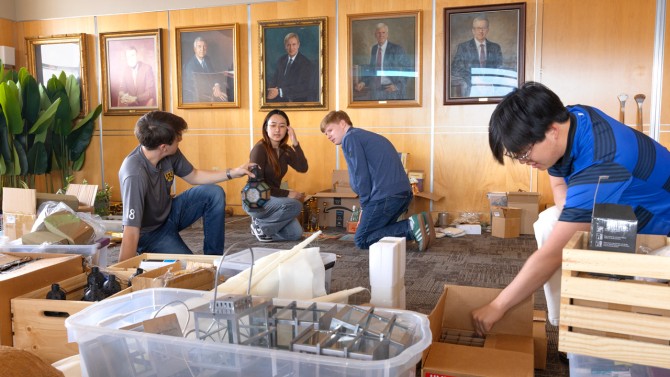
Jason Orenstein (from left), Vicki Wang and Spencer Kim assemble decorations in the Silver Birch Suite in Statler Hall, which the Hotel Ezra Cornell organizers turned into their design-build studio ahead of this year's conference.
Less space, more guests: Hotel Ezra Cornell adapts in its 100th year
By Holly Hartigan, Cornell Chronicle
Inside Statler Hall, there’s a four-foot fake peacock in the Silver Birch Suite awaiting its debut, boxes of commemorative Teddy bears stacked up in an unused office and a meeting room that looks more like a grocery store, filled with dry goods like oil and sugar and boxes of chips.
With renovations in Statler Hall making food lab and planning spaces unavailable, constraint has inspired creative problem solving for the student organizers of the 100th annual Hotel Ezra Cornell (HEC) conference, which starts April 24.
“Trying to navigate how we’re going to put on a conference without a dedicated kitchen has been very unique,” said Sarah Newcomb ’25, this year’s managing director of HEC. “We’ve had to come up with some really creative solutions throughout the year to make it all work.”
The group typically uses Statler Hall’s food lab spaces to prepare food, but they are being updated for the first time since they were built in 1988. On the Statler Hotel side of the building, the meeting rooms where the HEC team typically stores, stages and assembles materials are closed for renovations. The amphitheater, which they use for programming during the conference, is also getting a facelift and is unavailable.
And they’re expecting 270 guests to attend, up from 175 last year.
“It’s been absolutely double the work for everyone,” said Newcomb, who is a hotel administration major in the Cornell Peter and Stephanie Nolan School of Hotel Administration at the Cornell SC Johnson College of Business. “I think we all know that we’re doing something that’s bigger than ourselves in terms of the fact that it’s the 100th celebration.”
Students run every aspect of HEC, from the theming and programming to food service and clean up. Every year an advisory committee of faculty members and staff interview and appoint a board of directors, who enroll in the HADM 4910: Hotel Ezra Cornell class, earning three credits each in the spring and fall.
“They’re in charge of all of the aspects of creating the conference with full support from the hotel and from the school,” said Heather Kolakowski ’00, senior lecturer in food and beverage management at the Nolan School and chair of the HEC advisory committee.
The directors select and hire assistant directors and managers, and approximately 500 volunteers will help staff the four-day event. The structure is similar to the planning committee at a hotel, Kolakowski said, with an executive chef, food and beverage director, marketing and communications director and rooms director.
Recognizing the complications the group might face this year, they added a new department: logistics.
The logistics department investigated alternative spaces, negotiated rentals, designed and re-designed floor plans and supported the other departments in scheduling kitchen time.
Logistics director Jessica Lee ’26, a hotel administration major, said her team spent hours building strategies and testing plans, many of which had to be scrapped in favor of new plans.
“I’ve been practicing not being too attached to different ideas I’ve had, being able to switch up and adapt,” she said. “It’s been really lovely to see that my team has emulated that spirit a lot too. There’s no complaining when something doesn’t happen. They know when it’s time to switch gears and ultimately put the needs of the organization above their own egos and attachment to the work they’ve done.”
With no amphitheater, they’re using spaces in Willard Straight Hall and the Physical Sciences Building for programming.
“It’s kind of exciting that we get to show guests in new part of Cornell,” Newcomb said; they thought ahead about the guest experience, and developed maps and signage to ensure attendees can find their way.
With no food labs, the culinary team is using The Terrace Restaurant’s space in Statler Hotel after the restaurant closes as well as the teaching kitchen inside Tompkins Cortland Community College’s Coltivare in downtown Ithaca.
With less storage and design space, they’ve taken over conference rooms and meeting spaces in Statler Hall, as well as Kolakowski’s basement and the office of a faculty member who is on sabbatical.
“Normally, we’re like, ‘OK, Plan A, this is what we’re doing,’” Kolakowski said. “This year they have to think about, ‘OK, here’s Plan A, and then Plan B, and then Plan C.’”
Some solutions might persist, Lee said.
With less refrigerator and freezer space, they are using a rented refrigerated trailer parked at a loading dock. It’s not unusual to use a trailer for HEC, but this year the team built shelving for the truck and developed a floor plan to organize the goods ahead of time.
Lee remembered watching the culinary team struggle to find produce in boxes on the floor of the trailer last year, but this year they can find items much more efficiently.
“What I’ve realized in the past couple of weeks is that the renovations and the logistical challenges that they’ve posed have forced us to think really creatively about how we want to utilize the more limited space we have,” she said.
A colleague recently suggested to Lee that the renovations might be one of the best things to happen to HEC’s student-organizers. “I’m going wait until after the conference to back that claim up,” she said, “but I wouldn’t be surprised if, in 10 days, I think that that’s true as well.”
Media Contact
Get Cornell news delivered right to your inbox.
Subscribe

